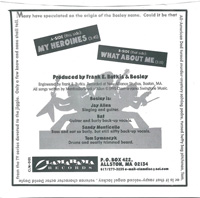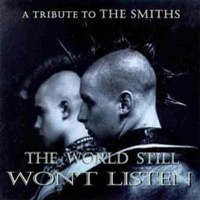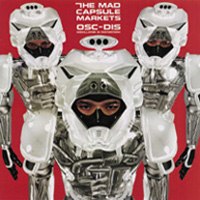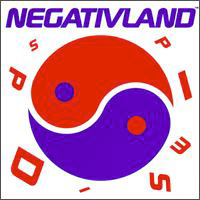 Negativland
Negativland
Dispepsi (Seeland)
An interview with Don Joyce
by Nik Rainey
If you know anything about Negativland, you probably know the trouble they’ve seen. You may have heard about the media prank that got out of hand and led to many sources reporting as fact that one of their songs made a Midwestern teenager hack his parents to death with an axe. You may even know about the mysterious blaze that destroyed much of their studio and almost did the same to their career. But if you know anything about Negativland, you almost definitely know about the legal fracas involving a certain Irish rock quartet, a particular unctuous-voiced radio personality, and a once-interesting punk rock guitarist and independent record mogul to be named later, a melée that garnered them loads of publicity and made them a test study for copyright-law issues, but threatened to overshadow the pioneering, head-spinning and hilarious work the Bay Area group has done in the field of audio terrorism. Since 1980, Negativland’s mission has been to rearrange the sensory overload the mass media constantly bombards us with and spit it back out in ever-changing permutations, an aural crazy quilt that not only serves as a statement on our over-saturated society but as the funniest, most multi-dimensional listening experience since the early days of the Firesign Theatre. Their latest project, Dispepsi (an anagram of the real title – call their “Word of Mouth Line” at 510-466-5253 for the correct spelling and pronunciation), is typically ambitious, dissecting the saturation-bombing of corporate advertising, using a certain carbonated beverage as their example. For more, let’s go to Don Joyce, host of the free-form radio program Over the Edge and Negativlander since 1982, at his headquarters in Oakland, California.
So Dispepsi is the new album, if I may say the title…
Yes, you can say it. Our whole use, or non-use of the title on the package is just our commentary on trademark law. It suggests there might be a problem with printing the title, but there’s no problem with saying the title, that’s free speech.
What would you like people to get from the new CD?
There are probably a lot of points to glean, from pure aesthetics, how it’s put together and the kind of music it is, to the content itself… I don’t know if there’s a single point you should “get,” I don’t think we should reduce it to that. It’s certainly about advertising in general, how it works, and what its various effects might be on culture and the environment we live in, how much major corporations kind of control the environment at this point. Maybe it’s kind of a reaction to constantly being bombarded by corporate advertising, everywhere, all the time.
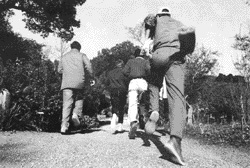 Like you say on the album – “All of the cola commercials that were appropriated, transformed and re-used in this recording attempted to assault us in our homes without our permission.” And I also liked the proposal included in the album (a suggestion to the two major cola companies that, since everybody in the world already knows what their beverages taste like, they could save millions of dollars by not advertising anymore), I thought it made a good point.
Like you say on the album – “All of the cola commercials that were appropriated, transformed and re-used in this recording attempted to assault us in our homes without our permission.” And I also liked the proposal included in the album (a suggestion to the two major cola companies that, since everybody in the world already knows what their beverages taste like, they could save millions of dollars by not advertising anymore), I thought it made a good point.
I wonder if they’ve ever thought about it. It’s so obvious that I wonder if they aren’t even doing that now. I don’t know, I don’t follow their commercial placement that closely to know if they’re missing every now and then.
It doesn’t seem that way…
It’s totally corporate imagery now, they aren’t even selling cola anymore. They’re just trying to make the flashiest commercial they can so people can say “hey, that was the best commercial at the Super Bowl,” regardless of what the product is. They’re looking for an impressive presence rather than trying to sell a product.
And they’ve enveloped the globe as well. You can go out of the country to some pretty rundown, squalid places that look like they don’t even have electricity and yet there’s Coke and Pepsi billboards looming over these shacks. Why did you focus particularly on Pepsi?
You know, that’s a question everybody asks and it’s surprisingly difficult to answer. There are many standpoints that come together when we make something: number one is what kind of material do we have, and we had a lot of material on Pepsi, so that was a big starting point. It could have been any number of similar multi-national corporations. Our point was not to pick so specifically on Pepsi, but to show what is typical of a lot of these corporations by taking one that everybody knows, take a lot of the commercial campaigns that this corporation uses, put them all together and create among other things the kind of saturation that the advertising itself uses – it’s around you all the time, and calculated in such a way that the name of the product is not supposed to leave your brain. We were after the same kind of effect in the listening experience, so by the time the disc is over, you’re pretty saturated by Pepsi.
They’ve started getting almost arrogant about that – like Nike, they don’t even use their name on their product anymore…
It’s become a highly aesthetic-based thing. A lot of commercials, they don’t even care if you know who they are. It’s all about new ways of getting your attention. People are so dulled by commercials in general and the commercial message, that, and you see this especially on TV, the commercials are often the most inventive thing on there. The shows are completely predictable and formularized compared to some of the surprises that come along in commercials. Now you’ve got these sort of arty commercials, where you’re not even sure what you’re looking at, and anti-commercials, which are very self-reflective and make fun of commercials in general, trying to attract your cynicism, I guess.
That’s gotten into popular culture in general, it seems. You do that as well – you set something in motion with one work and then comment on it in the next.
Yes, certainly. That’s the way it’s gone – self-referentialism, like many things, is something that started in a lot of artistic areas and then moved into commercials – they’ll co-opt anything that seems to be attracting attention. They’re quick to jump on anything and make it into a commercial.
With that in mind, has anybody approached you guys to do something like that, or have you seen them appropriate your ideas into commercials?
I see our techniques all over commercials these days. In fact, I feel kind of old and stale watching them sometimes, to see how much cut-up, rearranged and appropriated material is going into them. You know, you’ve got dead Fred Astaire dancing around in a vacuum cleaner commercial, all sorts of instances where they’ve taken stuff from other sources and digitally incorporated it into advertising.
And isn’t it interesting that they only use the dead people?
It’s probably easier for them to use somebody long-dead in a contemporary setting, it makes it more amusing or something. Certain people in art have been doing the same thing for similar reasons. I don’t know – I wonder what Fred would think to see himself dancing with a vacuum cleaner.
He’d probably think it sucks, heh heh…
(silence)
How are your legal troubles these days? Anything still pending?
No, all that’s wrapped up, so now we’re moving into new territory, and we’ll see what happens with that.
Do you foresee any problems with this? A cynical person would imagine you sitting around, rubbing your hands, trying to think of new ways to get into trouble..
No, that’s really not the case. Getting sued is one hell of a mess. I don’t know if you’ve ever been sued, but it’s just awful, it ruins your life for a long, long time, many, many months. So no, that’s nothing we seek at all. However, we’re torn – we do seek to expand the envelope of appropriation-based work, that’s the kind of thing that we like to do, and the fact that these laws are there to intimidate us is just a fact of life. But we do it all the time and we hope that by example, we can most clearly point out just how basically amusing and horrible this stuff is in the real world. And I think that the whole situation really needs help. As far as I can see, the laws are getting more strict, not less, more tightening up around the idea of everything being untouchable. So we do our little part and go as far as we can – I don’t think we go too far at all, but someone else may. It’s really unpredictable as to who will object to what. The only time we had a problem with our source material was the obvious example, the time we got sued by U2, or by Island records, I should say. That’s the one time and it doesn’t seem to really make a whole lot of sense, I mean, we were doing the same kind of thing long before that happened and we’ve been doing it ever since.
And U2’s done it too!
Yeah, on the Zoo TV tour. It was ironic that they had that big dish and were taking commercial programming out of the sky without permission and charging an audience to see it rearranged in front of them, which means that all we do with audio, they were doing with their giant video system.
And making a lot more money doing it.
Oh yes.
What other projects are you working on to follow this up?
I’m working on something called Moonrock, which is a serial that will be put up on our website in installments to run for maybe a year or so. That’s sort of a fictional fantasy, kind of a science-fiction, time travelling thing, rather elaborate and I hope a little amusing. We’re actually putting audio footnotes in it, where we have a little button you click to get various excerpts from Over the Edge from over the years and bits of other projects I’ve been working on that all fit into the text of the serial. Right now I’m devoting Over the Edge a lot of the time to these Moonrock footnote shows, doing a lot of things that can be fit into this context. I’m kind of acting like I’m writing the serial on the air. It’s taking up a lot of my time, it’s become this huge sort of project that I’d like to get far enough ahead on so I can start putting it up there.
Any plans to syndicate Over the Edge?
Many years ago, I tried to get it syndicated on the NPR satellite for people to take down, and you’re supposed to submit proposals for that to get funding, which I did, and that got nowhere. So now I’m trying to get it up on the web, but KPFA doesn’t have the right kind of server to do it and has no money to pay for one, so we have several people trying to figure out a way to maintain it and get it up there on the web live every week. Haven’t gotten too far, but we’ve had a lot of requests for us to do that. And it would be great to get it all around the world like that.
Total Negativland saturation.
Something like that.

